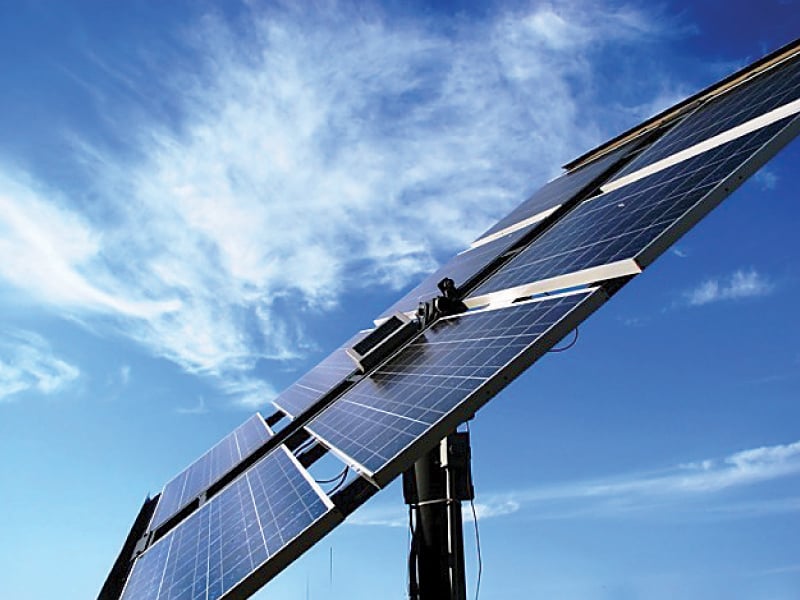
The efforts of the Punjab government to produce electricity from alternative energy sources to overcome shortages seem to have slowed down in the wake of frequent transfer of energy secretaries in the past around two and a half years, The Express Tribune has learnt.
The province has selected 21 potential sites since June 2011 for producing about 430 megawatts of electricity from alternative and renewable energy sources including coal, solar, hydroelectric, biogas, wind and biomass.
The province is working on the energy projects as the 18th Amendment to the Constitution has allowed provinces to undertake power generation ventures.
In June 2011, Punjab established an energy department with the task “to utilise all available resources in the province to provide affordable energy to all segments of the provincial economy through increase in generation and conservation.”
The province established the Punjab Power Development Board to facilitate private sector investment in power plants, the Punjab Power Development Company to undertake public sector and joint venture projects and the Power Projects Management Unit to implement the Asian Development Bank-funded five low-capacity hydroelectric power projects and conduct a feasibility study for five more.
Rab Nawaz, a BS-20 officer, was posted as secretary of the energy department to help increase energy production and overcome the shortfall. He was removed on April 13, 2012 apparently because of poor response from foreign investors.
Later, Muhammad Jahanzeb Khan, said to be the chief minister’s most trusted bureaucrat, took over, but he too was replaced on the same ground on July 1, 2013 as the department failed to attract private investment and undertake feasibility studies on the production potential of selected sites.
Usman Akhtar Bajwa, a Pakistan Administrative Service officer who had an engineering background, replaced Khan to run the energy department. However, on November 4, he was also shown the door and made an OSD as he failed to speed up work. Later, Khan was given an additional charge of the post and designated as ACS in BS-21.
Under the Chief Minister Ujala Programme, the Punjab government has distributed 204,196 solar lamps free of charge among students, which cost the public purse about Rs2.604 billion.
“Constant transfer of secretaries (of the energy department) disrupted the process of documentation, negotiations and supervision of projects because of which these were feared to be delayed,” an official commented.
Of the total 430 megawatts planned to be produced, 200MW will come from four coal-fired power projects, 60MW from solar plants, 148MW from hydroelectric projects, 4MW from biogas, 10MW from biomass and 8MW from wind.
According to a study conducted by the government, Cholistan has the potential to produce 50MW of solar power and a site in the suburbs of Kasur has the capacity to produce 10MW.
Among coal-run plants, four sites have been mentioned in the study conducted in association with interested private sector investors. These plants will be constructed in Katha Sughral district, Khushab, Choa Saidan Shah, Chakwal, Lila Pind Dadan Khan and Malikwal to produce 50MW each.
Two biogas plants are planned to be developed in the outskirts of Lahore. One plant, with a capacity of 2.5MW, will be located at Gowala Colony, Rakh Chand Rai and second plant of 1.5MW will be built at Gawala Colony, Harbanspura. The wind project will be set up at Kallar Kahar, which will produce 8MW.
The biomass project can be developed in any city, which is producing wheat and sugarcane in huge quantities, as it will consume raw material of these crops to produce 10MW of electricity.
Punjab is also planning to establish the Quaid-e-Azam Solar Park over an area of 5,000 acres at the Cholistan Development Authority in Bahawalpur district. This park has been registered under the Companies Act with the Securities and Exchange Commission of Pakistan.
A Punjab government spokesperson told The Express Tribune the government was striving to ensure strong coordination between the energy and other departments like agriculture, food, industries and mines. To meet the challenge, he said, Punjab re-designated the post of energy secretary as ACS in an attempt to appoint a senior officer.
“The government upgraded the post in order to meet growing requirements. Tenure of the post is being discussed,” he added.
Published in The Express Tribune, November 15th, 2013.
Like Business on Facebook, follow @TribuneBiz on Twitter to stay informed and join in the conversation.
COMMENTS (1)
Comments are moderated and generally will be posted if they are on-topic and not abusive.
For more information, please see our Comments FAQ


1725030039-0/Untitled-design-(2)1725030039-0-165x106.webp)
1725366721-0/kyle-(1)1725366721-0-165x106.webp)
1731410017-0/BeFunky-collage-(45)1731410017-0-165x106.webp)



1732084432-0/Untitled-design-(63)1732084432-0-270x192.webp)








coal is not alternative energy...